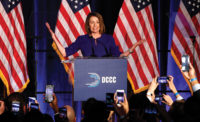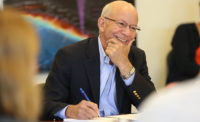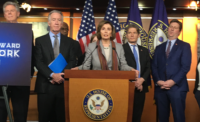Two weeks after reaching an agreement with President Trump to work on a major infrastructure investment plan, House Speaker Nancy Pelosi (D-Calif.) is upbeat about the chances of making such a plan a reality.
Speaking to a meeting of the Transportation Construction Coalition, an industry group, in Washington, D.C., on May 14, Pelosi said, “We just have to stick with the program. I’m confident that it will happen.”
She added, "We just want to roll up our sleeves and—three words—build, build, build."
Pelosi did not, however, discuss what nearly all see as the major hurdle in developing an infrastructure plan plan—how it will be paid for.
At their April 30 White House meeting, Pelosi and other leading congressional Democrats and Trump agreed to reconvene on about May 20 to discuss options for funding the envisioned proposal.
Sen. Tom Carper (D-Del.), who attended the White House meeting, said, "I'm told there is a date" for a followup meeting but he didn't know what that date is.
Carper told reporrters after addressing the construction coalition he has heard that Republican lawmakers will be invited to the upcoming meeting, which he hopes will take place during the week of May 20.
Pelosi wants to make sure that projects funded by the plan will get underway and won't be challenged in court. "We don't want lawsuits," Pelosi said. "We want dirt to fly."
Pelosi also outlined what the components of the plan would be. They include highways and bridges, mass transit and water systems. She added, “We must do broadband and modernize the [electric-power] grid.”
She said that there were needs in education and housing. "We have a tremendous [infrastructure] deficit in our schools," Pelosi said. But she said that housing and education wouldn't be part of the $2-trillion program, but instead addressed separately.
She also said the program would be "green" and seek to promote infrastructure resilience..
In her remarks, Pelosi placed the envisioned new infrastructure plan in the line of major public works initiatives through U.S. history. She cited President Eisenhower’s launch in the 1950s of what became the interstate Highway System, and added that Eisenhower "enlarged the issue" beyond a construction program.
"It was, sure, about roads, etc.," Pelosi said. "But it [also] was about unifiying our country."
She also pointed to the building of the trancontinental railroad, in the 1860s, and President Theodore Roosevelt's move to launch national parks in the early 20th century..
Reaching back further in history, Pelosi mentioned Thomas Jefferson, who, as president, commissioned Treasury Secretary Albert Gallatin to carry out what became an 1808 report on "Public Roads and Canals."
She said of the potential new plan, "I see it in that historical perspective, of something on the scale of our founders."




